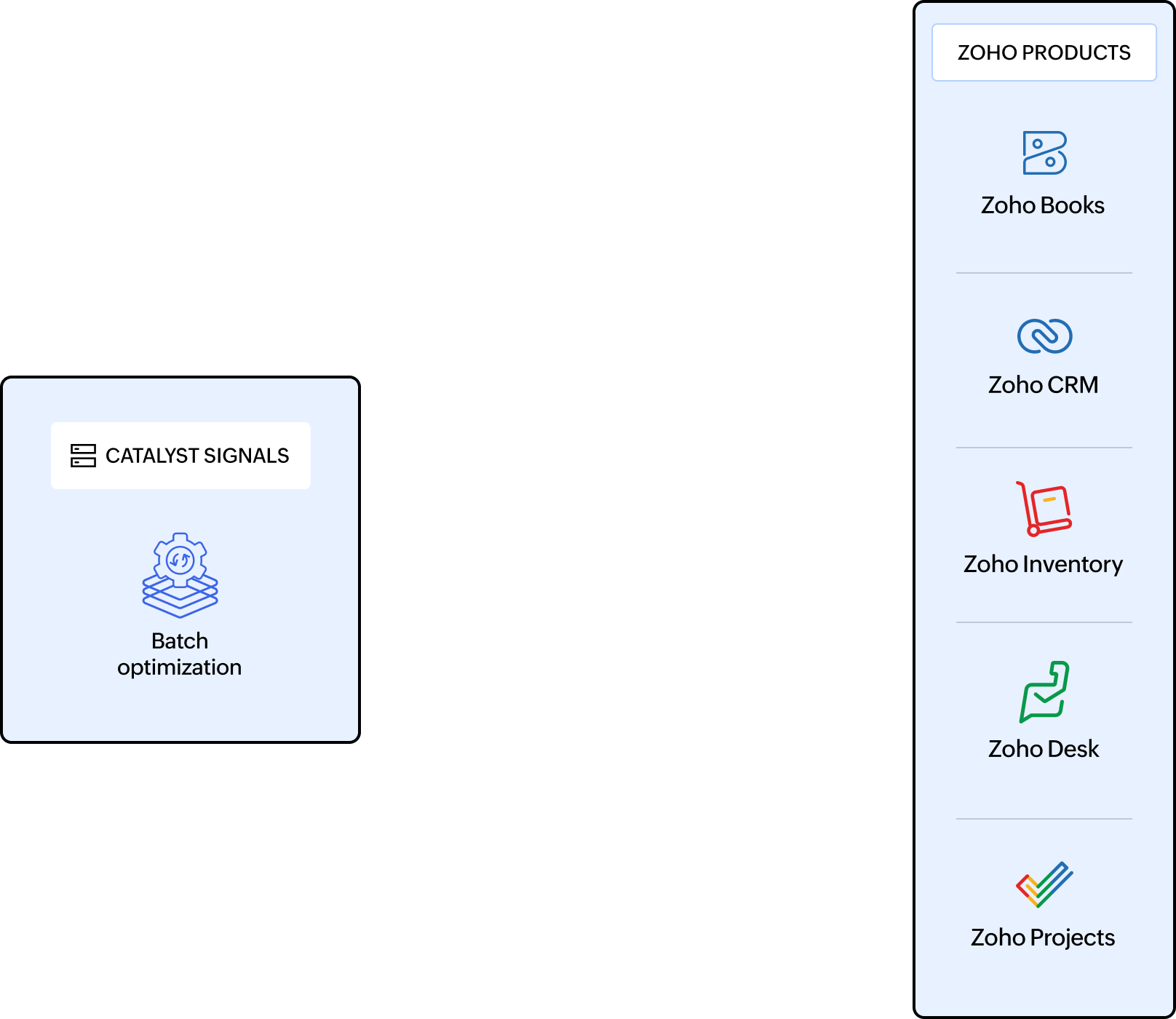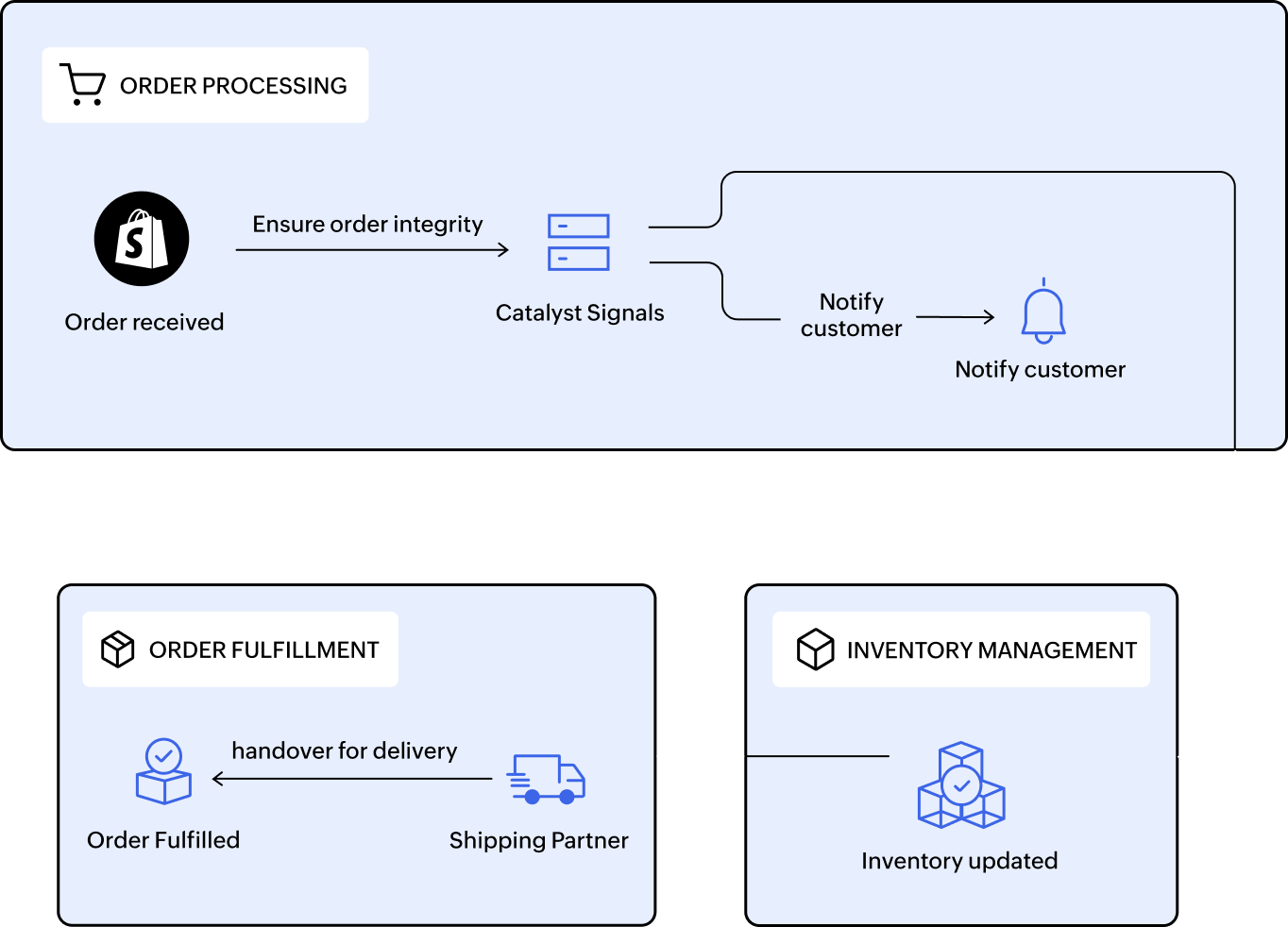A scale-driven service, for Event-Driven Architecture
Signals makes interoperability at scale a breeze, while enabling you to carry-out Data Bridging operations, and Channelization with the help of multiple dispatch configurations and management. Break away from the shackles of monolithic architecture and decoupled environments. Signals enables your applications with high-functioning, co-event broadcasts.

One service to manage millions of events
Data synchronization
Catalyst Signals enables real-time data synchronization across systems, both internal and third-party, with a code-free setup. It seamlessly transfers data and customizes event schemas without any coding.
Cross service workflows
Through event-driven orchestration, Catalyst Signals captures events with custom publishers and routes them to Targets (Webhooks, Functions, Circuits) via Rules. This code-free setup ensures seamless communication, automating tasks like data updates and notifications to boost efficiency.
Audit & Logging
Gain control with a centralized framework for tracking and managing events via Logs and the Dashboard. This insight into event rules optimizes performance, ensures compliance, and boosts efficiency for proactive decision-making.
Event based integrations
Catalyst Signals makes event-based integrations easy by enabling hassle-free ad-hoc connections between Publishers and Targets, processing real-time data across various environments without complex setups.
Programmatic Control. Zero Complexity.
Ingest, transform, and route data with precision using custom rules and schema mapping. Turn raw events into actionable triggers—effortlessly.

Key Benefits
- Ad-Hoc Integration
Customer Portal Application developed in Catalyst is integrated with Zoho CRM to manage the deals and orders.
- Data Synchronization
Customer grievance redressal survey data is sourced and extracted in Signals and then pushed in batches to Zoho Desk as tickets.
- Decoupled Workflows
Purchase Order valuation and multi-tier approval for payment processing with orchestrated accounting procedures.
- Audit and Logging
Visitor tracking data is sourced and processed in batches using Signals and enriched using Functions and stored in database.
- Data Intelligence
Customer wise order details are sourced, processed, and dispatched in size-based batches for training an Al model to generate recommendations.
The Zoho Advantage
Catalyst Signals allows you to integrate and respond to events from Zoho products without using up webhook API calls from their product licenses. Signals offers a highly resilient and scalable data transport mechanism across Zoho applications, reducing latency and API credit overheads. Signals provide support for a range of Zoho products by default and establish connections with the default Zoho products (as publishers) through internal authorization, eliminating the need for manual authorization and configuration.
Customizable rules
Rules helps you to identify the events needed to trigger downstream processes in a target system. Configure the routes and delivery methods for these events—whether in batch, queue, or scheduled mode—using rules. You can also transform events to change their structure before passing them to other targets. This enables you to build intricate orchestration flows with different schemas for the same event across multiple targets.
Analytics Dashboard
Get valuable insights into your events with the Signals analytics dashboard. Drill down into trends, identify patterns, and make data-driven decisions to optimize event processing.

Use cases
Bulk data transformation for target compatibility
Say a platform like Spotify gives you data in a formats incompatible with the tools you use. Signals can transform Spotify order data (renames fields, adjusts formats) for seamless mapping and transformation of fields, ensuring compatibility with the tools of your choice.
This eliminates the need for manual intervention in data structuring.

Batch invoice processing for financial reporting
Signals can aggregate invoices from your accounting software and deliver them in batches to an external financial system.
This reduces API load and ensures reliable delivery with retries.

Native event processing for the Zoho ecosystem
Connects multiple Zoho products (CRM, Books, Inventory) without complex API setups.
Support batch processing to optimize API usage.

Guaranteed sequential delivery for critical workflows
You can use Signals to ensure event order integrity (for example, Shopify orders → Zoho Inventory updates). Eliminate stock mismatches and ensure smooth order fulfillment.

Ready to build event-driven systems the smart way?
Try SignalsFrequently Asked Questions
Event-driven integration is a system design where data moves and actions are triggered in real-time, the moment an event (like "invoice paid", "deal won", or "stock updated") occurs. Instead of polling for changes, Catalyst Signals listens for and reacts to events as they happen.
- Automate in Real Time
- Build Smart Backend Workflows
- Orchestrate Operational Systems
- Enable Decoupled, Scalable Architectures
- Build Data Pipelines
- Integrate with External or Custom Systems
- Create Feedback Loops
Catalyst Signals supports events from:
- Zoho Services like CRM, Books, Billing, Bigin, Inventory, Commerce, Survey, etc.
- Catalyst services - Cloudscale components for now.
- Custom publishers via REST API — you can push any custom event into Signals.
- Create a publisher (Zoho app or custom REST source)
- Define a rule – include filters, transformations, and targets
- Choose a delivery mode (Queue or Batch)
- Set up your target (Catalyst Function, Circuit, or Webhook)
- Start sending events and monitor delivery
Zoho Flow is a visual, no-code automation tool ideal for orchestrating app-to-app workflows like syncing data or sending alerts. It’s built for structured, sequential tasks using pre-defined connectors.
Catalyst Signals is a developer-focused event routing system designed for real-time, high-volume integrations. It supports dynamic event processing with filtering, transformations, queue/batch delivery, and integrations via Zoho Catalyst or webhooks—making it ideal for scalable, and event-driven architectures.
Zoho CRM Signals is a built-in CRM feature that notifies sales reps about customer interactions—like email opens, chat messages, or form submissions—right inside the CRM interface. It helps teams stay informed and respond quickly to leads and contacts.
Soon, CRM Signals will be powered by Catalyst Signals, bringing more reliability, scalability.
Events are received from publishers and processed using the rule engine. Based on the selected mode, events are delivered to the target(s):
- Queue Mode: One-by-one, in the order received
- Batch Mode: Grouped by size, count, or schedule, then delivered
Catalyst Signals supports:
- Configurable retries
- TTL (Time-To-Live) settings
You can monitor delivery logs and reprocess failed events as needed.
Yes! Since events are pushed into the system (no polling), reactions are near real-time — depends on processing/transformation latency but typically under 1 second.
Absolutely. Use the Custom Publisher option to POST events to Catalyst Signals using the provided REST API. This makes it easy to integrate non-Zoho systems into your event-driven workflows.
